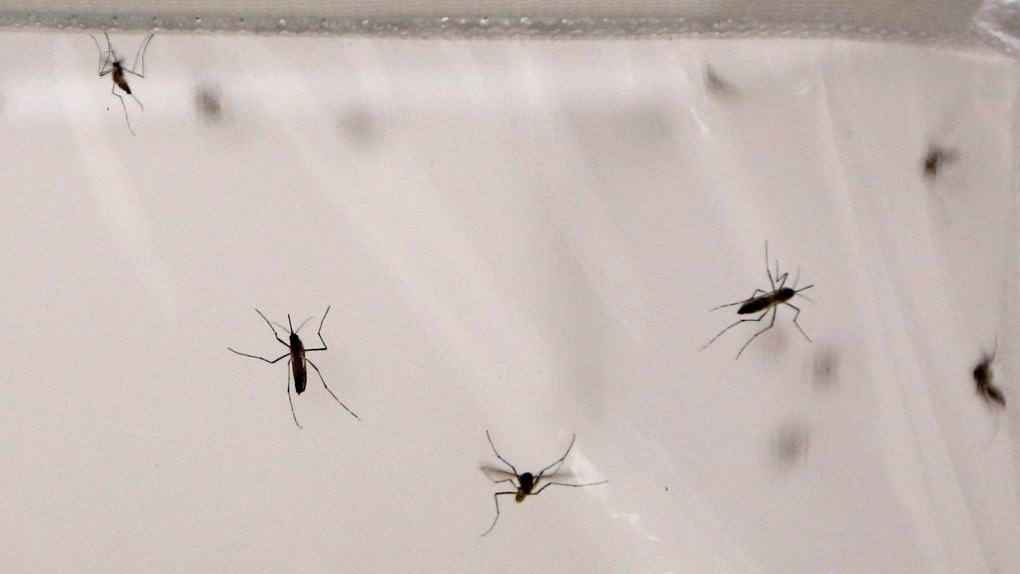Getting bugged by the midges? Just wait them out, says this insect expert
 Mosquitoes are seen inside a stock cage in a mosquito labaratory at the London School of Hygiene and Tropical Medicine in London, Thursday, May 30, 2013. Little black mosquito-like insects called midges have descended on the city. (AP Photo/Sang Tan)
Mosquitoes are seen inside a stock cage in a mosquito labaratory at the London School of Hygiene and Tropical Medicine in London, Thursday, May 30, 2013. Little black mosquito-like insects called midges have descended on the city. (AP Photo/Sang Tan)
If it seems like Toronto is being overtaken by midges – those tiny, winged insects that travel in swarms – well, that’s true.
Doug Currie, senior curator of entomology at the Royal Ontario Museum, told CP24 that while these bugs might be unsightly, they’re completely harmless. Despite having a relatively short lifespan, the insects are crucial to Lake Ontario’s food chain, said Currie.
So, before you swat away those pesky pests, here’s a few facts to get to know them first.
Why are we seeing more midges in Toronto right now?
The short answer: they’re mating, says Currie. “There are lots of different species, and different ones come out at different times,” he said.
“When they come out into the air as adults, it’s only for a few days,” continued Currie. “The only thing they want to do is mate. And they don’t feed on anything.”
While Currie acknowledges the midges can look overwhelming – “I know, they look like smoke,” he said – they’re not up to anything nefarious.
Where are you more likely to spot midges?
Near water, says Currie. The insects serve as an important source of food in Lake Ontario, and they tend to congregate around the lake and other bodies of water.
Are midges harmful to humans?
“Not at all,” said Currie. “They’re completely innocuous. And they’re really, really important to aquatic food webs. They’re important for fishes, birds, and other invertebrates. I can’t imagine how aquatic ecosystems would fare in their absence.
“If we have to worry the few times a year they come up in big numbers, that’s a small price to pay for the ecosystem services they provide to a healthy lake.”
Is there anything people can do to deter the bugs?
Not much, says Currie. “A bug zapper or something like that won’t do much,” he said.
Are we likely to get midges in big numbers later this year?
Yes! Currie says midges will likely mate again in the fall while it’s still warm. “But again, the adults only last a few days,” he said. “It’s not that bad.”
CTVNews.ca Top Stories

'Mayday! Mayday! Mayday!': Details emerge in Boeing 737 incident at Montreal airport
New details suggest that there were communication issues between the pilots of a charter flight and the control tower at Montreal's Mirabel airport when a Boeing 737 made an emergency landing on Wednesday.
Trudeau appears unwilling to expand proposed rebate, despite pressure to include seniors
Prime Minister Justin Trudeau does not appear willing to budge on his plan to send a $250 rebate to 'hardworking Canadians,' despite pressure from the opposition to give the money to seniors and people who are not able to work.
Hit man offered $100,000 to kill Montreal crime reporter covering his trial
Political leaders and press freedom groups on Friday were left shell-shocked after Montreal news outlet La Presse revealed that a hit man had offered $100,000 to have one of its crime reporters assassinated.
Cucumbers sold in Ontario, other provinces recalled over possible salmonella contamination
A U.S. company is recalling cucumbers sold in Ontario and other Canadian provinces due to possible salmonella contamination.
Trudeau says no question incoming U.S. president Trump is serious on tariff threat
Prime Minister Justin Trudeau says incoming U.S. president Donald Trump's threats on tariffs should be taken seriously.
John Herdman resigns as head coach of Toronto FC
John Herdman, embroiled in the drone-spying scandal that has dogged Canada Soccer, has resigned as coach of Toronto FC.
Billboard apologizes to Taylor Swift for video snafu
Billboard put together a video of some of Swift’s achievements and used a clip from Kanye West’s music video for the song “Famous.”
In a shock offensive, insurgents breach Syria's largest city for the first time since 2016
Insurgents breached Syria's largest city Friday and clashed with government forces for the first time since 2016, according to a war monitor and fighters, in a surprise attack that sent residents fleeing and added fresh uncertainty to a region reeling from multiple wars.
Canada Bread owner sues Maple Leaf over alleged bread price-fixing
Canada Bread owner Grupo Bimbo is suing Maple Leaf Foods for more than $2 billion, saying it lied about the company's involvement in an alleged bread price-fixing conspiracy.


































